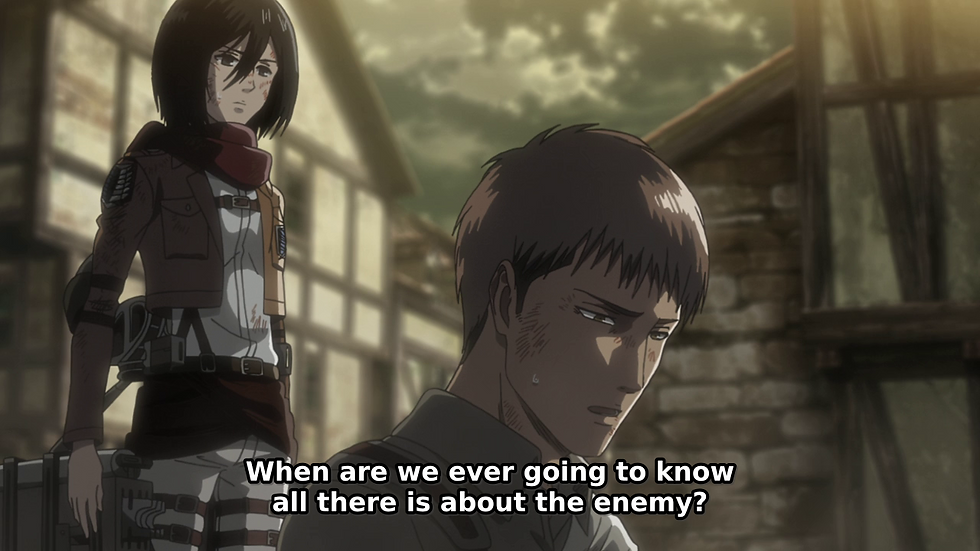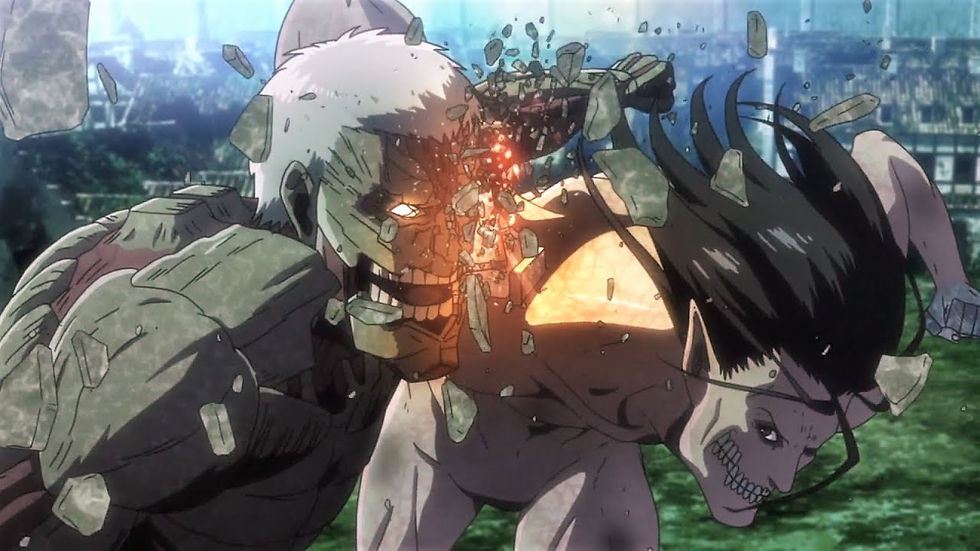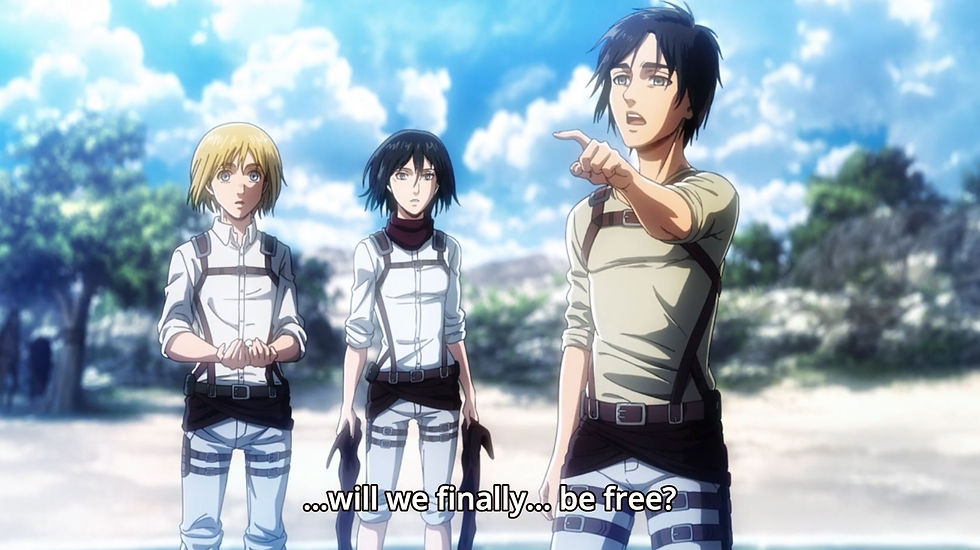Return-to-Series: Attack on Titan
- Joseph Lutholtz
- Aug 21, 2019
- 6 min read

Alternate Names: Shingeki no Kyojin
Score: 9/10, 5/5
Overall Score: 10/10, 5/5
Length: 3 Seasons (1 of 25 Episodes, 2 of 12 Episodes, 1 of 10 Episodes)
Genre: Action, Drama, Military, Political, Supernatural, Shounen
Summary: Long ago, humanity ruled the world until the Titans appeared and took their place at the top of the food chain. Driven by nothing but a desire to destroy and devour all of humanity, it seemed like nothing could stop these towering, humanoid monstrosities. Now, what remains of humanity lives like trapped cattle within in a single city guarded by three towering walls of stone, but at least they are safe from the titans. Or, at least, that was believed to be the case by most. Now, though, as the reality of their world has begun to unfold itself before the members of the Survey Corps, it is becoming clear that everything was a lie. The origin of the titans, the crimes of the monarchy, and the truth of what lies beyond the walls: all of these will be made clear so long as they can survive the threats both within and without the walls of Paradis.
Review: For the longest time, I couldn't recall how far I'd gotten into the Attack on Titan franchise during my last review. Now, I'm grateful to my past self for leaving me enough wiggle room to discuss the entirety of the series' third season. Thanks to that foresight, I find myself in a prime position to summarize the lowest lows and highest highs of the entire franchise, both of which can be found in the first and second parts of Season 3 accordingly. More importantly, though, I'm in an ideal position to discuss how this season learned from and built on the two seasons that came before it.

Spoiler Warning: It proves that it knew what it was doing all along.
Luckily for me, season three makes my job of reviewing it fairly simple. Since the larger season is broken into two parts, thanks to an extended hiatus in the middle, it's fairly simple to look at and regard the two distinct halves of this season separately. It might not be particularly fair for the first half but I've never been one to pass up an opportunity to make my life easier. So, to start things off, I'll simply say the first half of Season 3 is a bit of a mixed bag for me. On the one hand, it is a rushed mess of a story that goes through one specific arc in the manga so quickly that most of the big events of that arc feel pointless. The key example of this pacing problem that comes to mind is the fact that one of the arc's major players is literally killed off within five minutes of being introduced, forcing me to question why he was included in the series at all. On the other hand, though, I understand the show's desire to blow through this particular arc and get to the meat of the season's larger conspiracy. Known and reviled by many, the political arc and the build-up to the Survey Corps' inevitable conflict First Interior Squad are nothing short of grueling in the manga. With chapters only coming out once a month and half a dozen of those chapters feeling like nothing was happening, the political arc was easily one of the lowest points of the manga. I, personally, decided to drop the manga right as that arc ended out of fear that whatever arc came next would be no better. So, as I said, while I'm inclined to consider the first half's blistering pace a flaw, I also understand that it was necessary and, ultimately, the best decision in the long run.

After all, trimming the fat of the political arc means we get to see Levi back in action that much sooner.
Since the dramatic tension of the Survey Corps going into hiding after uncovering secrets the royal family would rather keep buried wasn't the actual focus of the arc, it makes sense that the anime would trim down the game of cat and mouse that was the political arc. With that accomplished, the anime was able to dedicate itself fully to widening the morally grey area in which the Survey Corps finds itself. Following the revelation that Bertold and Reiner were Titans all along, the members of the Survey Corps are forced to contend with the logical conclusion of that revelation: that they've just been killing other people this whole time. Gone is their bravado and righteous fervor to save humanity from Titans now that they realize that humanity's future will require them to kill more people who, potentially, could have been saved. Now, Eren and the team are forced to weigh their morals and dreams against the lives they've taken thus far as well as the lives they'll have to take if they continue down in their quest to go beyond the walls. As if that weren't bad enough, though, their being hunted by the First Interior Squad forces them into kill-or-be-killed battles with living, thinking humans. Set that drama to the backdrop of Krista and Eren coming to terms with their heritage and the conspiracy surrounding the royal family and you've got a season chock full of character development and moral quandaries. In other words, flawed as it is, the first half of season three is easily one of the strongest and most critically engaging of the seasons thus far.

Or, at least, it was critically strongest up until the second half came along and achieved perfection.
On the whole, Season 3 of Attack on Titan exists as something of an anomaly in the world of anime. Even though it is the third season of a long-running franchise--a third season that needed an extended hiatus in the middle I might add--it manages to be the strongest season of the franchise to date. To be clear, I'm not just saying that to fuel the hype train; I'm not even saying it because this season pays off everything the series has been building up to. I say it is the best yet because Season 3's second half is the distilled essence of every season thus far. It captures the near-nonstop action of the first season but also manages to make every second of that action matter. There is meaning and intention behind every word and action taken during the second half because every action has both direct and indirect consequences for things yet to come. What's more amazing, though, is that the collision of events that is the final confrontation with the Colossal and Armored Titans also gives meaning to actions and characters who, until now, seemed entirely pointless to the story as a whole. This expansion on characters' pasts, motivations, and personal conflicts is, then, the refining of the second season's better qualities. It might have been weaker in terms of its pacing and animation quality but Season 2 took the time to develop both the world and its characters as they start to play a role in the larger mystery of what the Titans are and what happened to the rest of the world. So, with Season 3's working to finally unravel those grand mysteries and develop how they affect our ensemble cast of characters, it'd only figure that those storytelling aspects would need to be refined.

The second half's refinement of established ideas doesn't stop there though.
There is, however, one last bit of improvement that the series makes to the tonal and intentional shifts developed each season. On top of the action of the first season and the character development and world-building of the second, Season 3 Part 2 also refines the introduction of hard questions and moral quandaries found in the first half. Without going into great detail, Part 2 prides itself on forcing all of its cast members to make incredibly difficult choices, none of which have a "right" or "wrong" answer. From risking their lives and the lives of those closest to them to choose who lives and dies in the course of their grand battle with the Beast Titan, Part 2 does everything it can to make every second and every choice matter. Like with old characters, though, it also makes it clear that everything that has happened up until now has always been the result of decisions made by those who came before him. Specifically, as they finally uncover the mysteries of the Basement, Eren and the rest of the Survey Corps come to understand that there have always been larger forces at work that simply haven't been seen yet. As they read Grisha Yeager's diaries, they learn the truth of their world and the history that led their people to hide behind massive stone walls. Unlike the manga, we see glimpses of that past in Ymir's flashbacks but they came without context. That isn't the case this time. With the conclusion of Part 2, most of the show's big mysteries and character arcs are concluded. What will happen from this point on is based on what the cast will do with this rediscovered knowledge of the world? The question becomes whether they'll strike out at the forces that imprisoned and tortured them for generations or simply accept their caged life and wait for the end to come. Either way, I cannot begin to express how excited I am for Season 4 and what developments it'll bring.


Comments